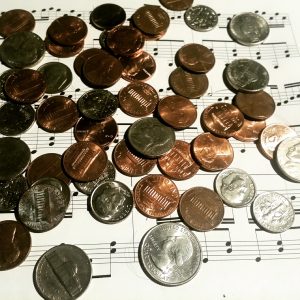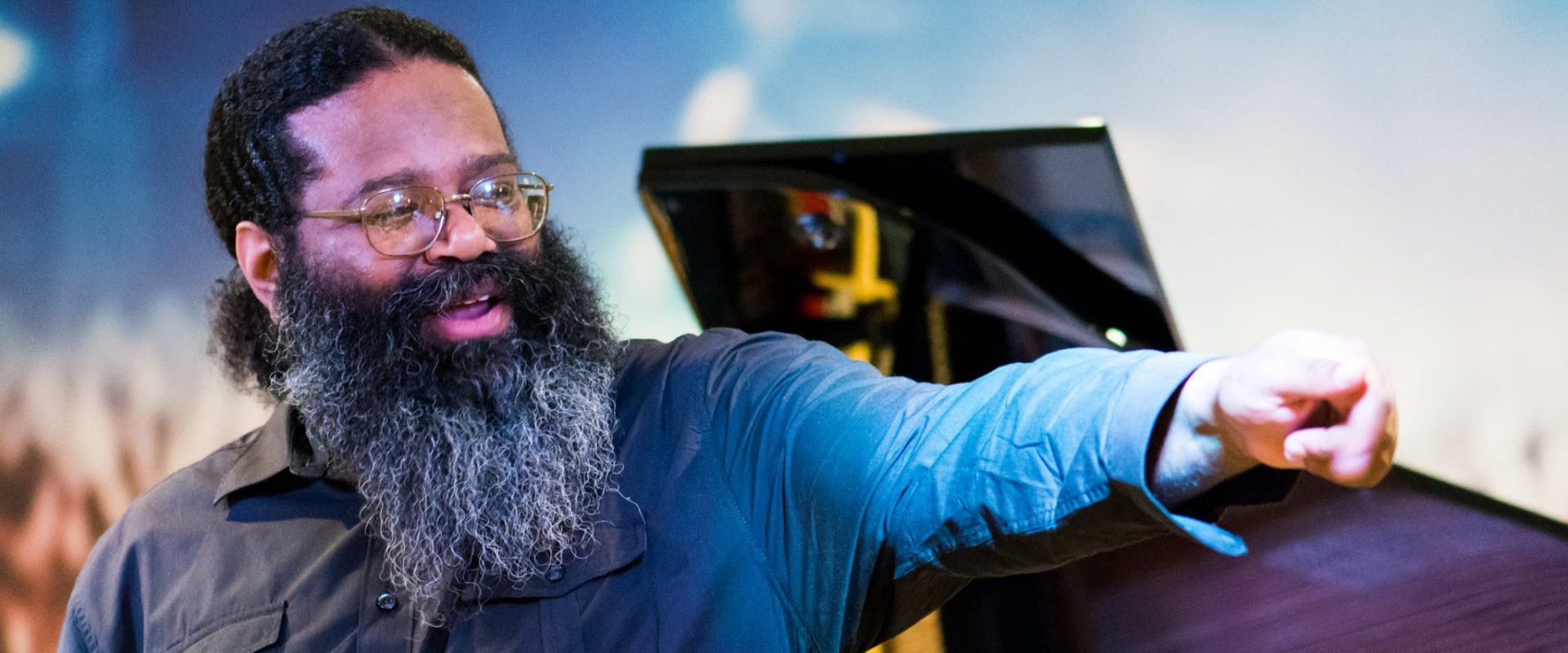The title says “The Artist’s Conundrum”, but there are definitely other fields that could probably identify with the topic. Teachers, nurses, administrative assistants, restaurant servers, and minimum wage workers (off the top of my head) have all had the value of their work questioned and dismissed. I am ashamed to admit that I once caught myself uttering discouraging words about – of all people – the person preparing my dinner. (We all have brief moments of idiocy.) The fact is that regardless of “status” in an organization, all of these roles are indeed important. Because I am writing this from my personal experience, I am going to discuss it from the standpoint of a musician.
As a freelance pianist and occasionally a musical director, I often have to negotiate for my services. Honestly, I hate that part. What it comes down to is 1.) I want to take home as much as I can and 2.) the client wants my services for as cheaply as possible. Sometimes, we’re in the same ballpark and come to a rather quick consensus. Other times – particularly when the “budget” is low – I must respectfully decline. (People, I promise you: Toni Braxton’s third ex-boyfriend’s sister’s mother-in-law’s cosmetologist’s cardiologist will not be scouting some fat bearded 38-year-old pianist playing at your office potluck for “exposure.”) Of course, there is also the game where the client calls to see what your rate is so he/she can then shop around for someone else to undercut you. Playing that game is a good way to ensure I never take your call again.
“Value” is a difficult thing to quantify, because it means different things to different people in different situations. There has been a lot of talk in the music industry about streaming rates and royalties paid to performing artists and songwriters. I have spoken in the past about Beats Music and its successor Apple Music not paying the artists for music streamed during their trial period. (Fortunately, Apple changed that practice after Taylor Swift complained.) As a musician, music is both my life and my livelihood. To Apple, music is an expense to sell electronics. That company couldn’t care less if the artists who create it can buy groceries.
Needless to say, I am not a fan of Apple.

There are many ways I could approach this subject. As a music teacher, I’ve argued with administrators who expected me to use a piano with multiple broken keys to teach a choir class. As a musician, I’ve listened to community theatres and churches declare their love and need for music, but object to giving musicians even a token payment (or honorarium) for their services. As a freelance musical director, I’ve talked on the phone with a pastor who tried to guilt/bully me into accepting a musical ministry position at a rate that wouldn’t cover the cost of rent. I’ve also dealt with more than a number of college music students who seem to believe pianists should be lining up for the chance to accompany them on recital. Every once in a while, I get a message from someone asking why I haven’t shipped him/her a CD… for “free”… at my expense.
I am not writing this post just to complain “YOU ALL DON’T VALUE ME!!!” The world doesn’t value itself, so why would I expect it to change its mind just for me? As I just said in the paragraph above this one, musicians oftentimes don’t even value each other. Here is a radical thought I want to throw out there: What are you paying for?
Are you looking for background music for your dinner? Okay… Why don’t you just pop a CD in the stereo and be done with it? Oh… you want someone that can take requests? Well, that’s a different conversation, right there. Oh, you want a band that can take requests? Well, assuming that you want them to sound decent, then they would probably have to transcribe, arrange, and practice it first. Or have already done so. Are you sure that $50 that you are offering every band member is going to cut it?
Are you looking for a pianist for your church service or are you looking for a choir director? That’s two different things and two different discussions. Is it a Catholic church? Do you want someone familiar with the order of service? Or is it an organist you need? I promise you that piano and organ are two different instruments. Not all pianists play organ. Do you need someone to lead your band? Oh… you have multiple choirs and musical ensembles? Do they have music arranged for them? Now… how experienced do you want this person? You want a music degree? Oh… you want a Masters degree? Does your budget reflect the qualifications and skills you need from your music director?
Here are some things I look at when I am mulling over a possible gig or position:
1.) What am I expected to do?
Playing “atmosphere” music, interacting with a crowd, accompanying a soloist, directing an ensemble, arranging for a band, and renting out a sound system are all different skills.
2.) How much preparation does it entail?
Are we talking 3-4 pieces or 3-4 sets? Does the soloist need to rehearse? Is there written sheet music or do I have to transcribe a recording? Am I arranging for a group? How difficult is the music involved? How many hours do I need to spend learning and preparing music?
3.) What’s the risk factor?
Am I accompanying an inexperienced soloist cold? Does the soloist need coaching? Do I need to have other music ready to go because of “unexpected delays”? Does the soloist know which key he/she is singing her selection?
4.) How convenient or inconvenient is it?
Is there a piano on site? Do I have to bring my electric piano? Do I have to bring my electric piano, lug it three blocks, and haul it up three flights of stairs? Is it outside and uncovered? Does the client expect me to bring a sound system? Do I have to set up three hours ahead of time and stay on site throughout the entire event? How far is it from my house? Do I have to dress up? What’s the weather forecast? What else am I doing that day? How does this affect my regular commitments? Does it end at 2 AM and involve a 5 hour drive home?
5.) What’s the payoff?
What are my expenses for the gig? How many band members do I have to pay? How much does it cost to get there and get home? Is this a one-in-a-lifetime experience? Will I make a profit? How will taking this gig affect my ability to take other gigs down the road? Does the payoff match the preparation hours?
6.) How interesting is it?
Am I learning something new or gaining new experience? Is it something I might consider pursuing more of? Is it a direction I want to go creatively? Will it allow me to make new contacts and further existing relationships? Besides the money, what else am I getting from this gig?
7.) Why me? Why not someone else?
What can someone get from me that they might not get from someone else? How does this gig rely on my experience/background?
A friend of mine explained it like this: “You’re not only paying for time being spent in your service, but also time/money already spent learning and perfecting the craft.”
I’ll have a much easier time playing keys for a last-minute band gig with lead sheets than another pianist who can’t read a lick of music. No offense meant to my non-reading peers, but I’ve done the work. Chances are that Herbie Hancock will have an easier time than I would… but you probably can’t afford Herbie Hancock.
Experience and practice time are both factors. If I need someone with the level and skill of a concert violinist, should I expect to pay this professional the same rate as I would a musician who picked up the instrument for the first time last year? If a higher level of experience and musicianship is required, shouldn’t that be reflected in the pay as well?
Music is one of those fields that people feel passionate about. A lot of people feel passionate about it. When I was preparing my debut album, I was constantly barraged by stories – not from musicians, but rather those who “know” musicians and therefore feel entitled to relate their experience on their behalf. You know the stories: 12 hours in a practice room every day after their full-time job. Playing and performing strictly for the “love” of the art form. Sweating day and night as the unknown, under-appreciated musical genius looking for the “big break” when someone is going discover them and deliver them a record deal.
Yeah… You know. Pure unadulterated romanticized bullshit. Yes, I said it. Yes, I meant every word.
I’m not saying that all musicians do music solely for the money. My entire working life has been working as a musician. There are definitely more immediate and more “reliable” ways to earn an income. That said… Since when does being an artist obligate you to give your work/services away at your expense? There are people who love running mega corporations and cross-examining witnesses in court who still expect to be paid. And they should.
There are a lot of people who think they appreciate and love music so much and yet their actions and even their words don’t seem to reflect that same appreciation for the musicians who create it. Music and the arts especially seem to inspire idealistic “fluffy” comments from “connoisseurs” along the line of “Music is a gift (from God). It is a privilege/honor/blessing to be able to make it. You shouldn’t be doing it for the money, anyway…”
Just. Stop.
If you’ve ever said those words, quit pretending. You don’t love music. You love listening to it without paying for it. If you truly loved music, then you’d be passionate about making sure the artists who create it can make a living and – you know – create more of it. The vast majority of artists don’t have the record labels you cite to justify the increasing transfer of wealth created from the music business toward the tech companies. No, the major labels are not friends to independent artists, but anyone who says “You should be happy with the OPPORTUNITY… You are getting EXPOSURE!” is even worse. (Let’s not even get into the fact that the major labels are stockholders in the tech companies whose rates you are defending and typically do not share their dividends with their artists.)
Exposure and opportunity are nice, but that doesn’t pay for side musicians, sound engineers, instruments, or anything else it takes to create a recording or fashion a sustainable career in music. That doesn’t help an artist invest in himself or pay his car insurance.
The fact is that creating art is work. It is work that involves a lifetime of study, practice, refinement, and experimentation. Art is trial and error, oftentimes in front of a live audience who may not understand (or care for) what you are trying to do or the skill you are perfecting. Art is taking a vision and trying to make something concrete out of it that you hope will make some sort of emotional connection. Every minute of “play” you see involves hours of “not play” that led up to it. Like any field, you have to spend time figuring out what you are doing before you can say “Okay… Yeah. I get that.”
So… I throw my earlier question at you one more time: What are you paying for? I follow it up with: Do you really value it?
TKP
10/12/15
